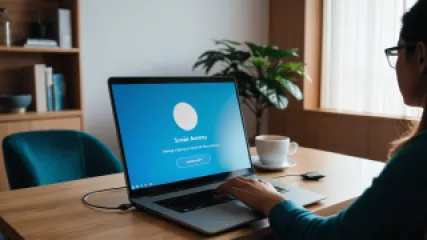How can online therapy help with social anxiety?
Social anxiety is a common mental health condition that affects millions of people worldwide. It can be characterized by intense fear and discomfort in social situations, leading to avoidance of social interactions and significant distress. Fortunately, there are various treatment options available to help individuals manage and overcome social anxiety, one of which is online therapy.
What is online therapy?
Online therapy, also known as e-therapy or teletherapy, is a form of mental health counseling that takes place over the internet. It allows individuals to receive therapy sessions from the comfort of their own homes, using video conferencing platforms or messaging systems to communicate with their therapist.
Online therapy has gained popularity in recent years due to its convenience and accessibility. It eliminates the need for in-person visits to a therapist's office, making it particularly beneficial for individuals who may have difficulty accessing traditional face-to-face therapy.
How can online therapy help with social anxiety?
Online therapy can be a valuable tool for individuals struggling with social anxiety. Here are some ways in which it can help:
1. Accessibility
One of the primary advantages of online therapy is its accessibility. Individuals with social anxiety may find it challenging to leave their homes or attend in-person therapy sessions due to their fear of social situations. Online therapy allows them to receive treatment without having to face their anxieties surrounding physical presence in a therapy setting.
Moreover, online therapy can be accessed from anywhere with an internet connection. This means that individuals living in remote areas or those with limited access to mental health services can still benefit from therapy for social anxiety.
2. Increased comfort and anonymity
Engaging in therapy from the familiar environment of one's own home can create a sense of comfort and safety for individuals with social anxiety. The absence of face-to-face interaction can help to alleviate some of the anxiety associated with traditional therapy settings.
Additionally, online therapy provides a level of anonymity that may be appealing to individuals with social anxiety. They can choose to remain anonymous or use a pseudonym during therapy sessions, which can reduce self-consciousness and make it easier to open up about their struggles.
3. Flexibility and convenience
Online therapy offers flexibility in terms of scheduling appointments. This is particularly beneficial for individuals with social anxiety who may have difficulties adhering to fixed schedules or attending regular therapy sessions. With online therapy, individuals can often find therapists who offer evening or weekend appointments, allowing them to receive treatment at a time that works best for them.
The convenience of online therapy also eliminates the need for travel time to and from therapy sessions, making it a time-efficient option for individuals with busy schedules or limited transportation options.
4. Social anxiety-specific treatment approaches
Therapists who specialize in treating social anxiety often incorporate evidence-based techniques into their online therapy sessions. These techniques may include cognitive-behavioral therapy (CBT), exposure therapy, and social skills training.
CBT helps individuals identify and challenge negative thought patterns and beliefs that contribute to social anxiety. Exposure therapy involves gradually exposing individuals to feared social situations in a controlled and supportive environment to desensitize them to their anxieties. Social skills training focuses on developing effective communication and interpersonal skills to enhance confidence in social interactions.
Through these specialized treatment approaches, individuals can acquire effective coping strategies and develop the necessary skills to manage and overcome social anxiety.
Are there any limitations to online therapy for social anxiety?
While online therapy can be highly beneficial for many individuals with social anxiety, it is essential to acknowledge some potential limitations:
1. Lack of in-person interaction
Some individuals may find that the absence of in-person interaction in online therapy limits their ability to fully connect with their therapist. Nonverbal cues and body language, which can be important in traditional therapy settings, may be less apparent during video or messaging sessions.
However, it is worth noting that therapists are trained to adapt to the online format and can still provide valuable support and guidance through virtual means.
2. Technological challenges
Online therapy relies on stable internet connections and functioning technology. Technical issues such as poor video quality, audio disruptions, or internet connectivity problems can occasionally interrupt therapy sessions and impact the overall experience. However, these issues are typically rare and can often be resolved with troubleshooting or alternative communication methods.
3. Need for a private and comfortable space
In order to engage in online therapy effectively, individuals need access to a private and comfortable space where they can freely express themselves without interruptions. For those living in crowded or noisy environments, finding such a space may pose a challenge.
It is important to consider these limitations when exploring online therapy as a treatment option for social anxiety. However, many individuals find that the benefits of online therapy outweigh these potential drawbacks.
Conclusion
Online therapy can be a valuable resource for individuals seeking help with social anxiety. Its accessibility, comfort, flexibility, and specialized treatment approaches make it a viable option for those unable or unwilling to pursue traditional in-person therapy. While there are some limitations to consider, online therapy has the potential to provide effective support and strategies for managing social anxiety.






